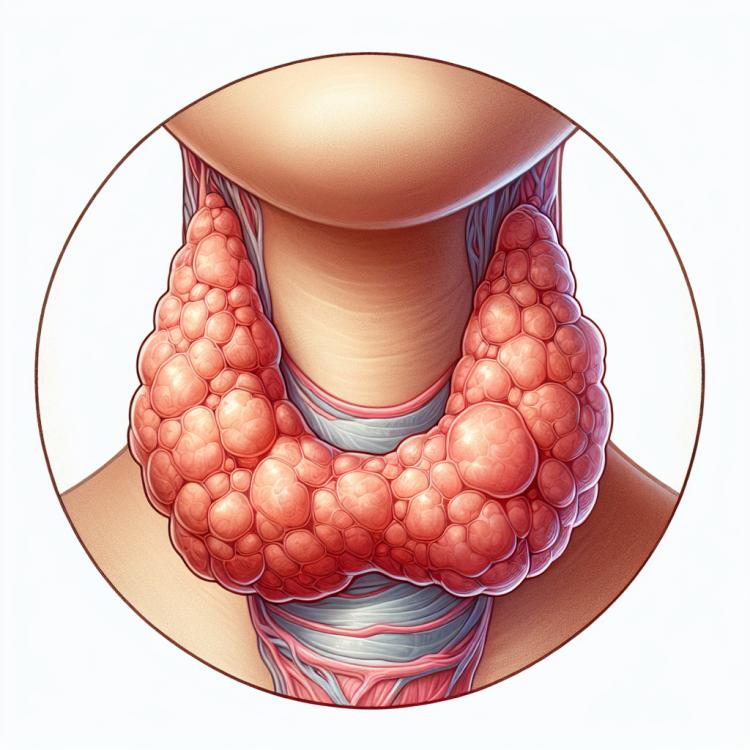
Toxic goiter: causes, symptoms, and treatment methods
Understanding Toxic Goiter
Toxic goiter, or hyperthyroidism, is an endocrine disease characterized by excessive secretion of thyroid hormones. It can be caused by various factors, such as autoimmune disorders, thyroid tumors, or excessive iodine intake. Patients with toxic goiter experience enlargement of the thyroid gland, hyperthyroidism, and characteristic symptoms such as palpitations, sweating, nervousness, weight loss, and hand tremors. Treatment for this condition may include medication, radiotherapy, surgical removal of the thyroid gland, and other methods, depending on the severity of the disease and the individual characteristics of the patient.
Etiology of Toxic Goiter
Toxic goiter, also known as hyperthyroidism, occurs due to excessive thyroid gland function, leading to an increase in the size of the thyroid gland and elevated levels of thyroid hormones in the blood. The causes of this pathological process are associated with autoimmune disorders, particularly Graves’ disease or thyroid pathology that triggers its excessive activity. Various factors may contribute to the development of toxic goiter, including genetic predisposition, environmental exposure, insufficient iodine intake, or consumption of iodine-rich foods.
- Disorders of the immune system can lead to the development of autoimmune thyroiditis and toxic goiter.
- Increased sensitivity of the thyroid gland to thyroid-stimulating antibodies may contribute to the development of the disease.
- Uncontrolled intake of iodine in large doses, for example, through dietary supplements or medications, can cause hyperfunction of the thyroid gland.
- Inherited factors may play a role in the onset of toxic goiter, especially in cases where family members have had similar issues.
- Some medications, such as amiodarone, lithium, and potassium iodide, can cause thyrotoxicosis and the development of toxic goiter in some individuals.
The clinical appearance of Toxic Goiter
The clinical appearance of toxic goiter is due to the excessive production of thyroid hormones, which can lead to various symptoms and manifestations. Patients with toxic goiter often experience involuntary weight loss, increased feeling of heat, rapid heartbeat, irritability, anxiety, exhaustion, menstrual irregularities in women, hand tremors, nervousness, weakness, sleep disturbances, frequent urination, and sweating. Additionally, patients with toxic goiter may exhibit an enlarged thyroid gland, eye symptoms (including protrusion of the eyeballs, exophthalmos), tenderness in the area of the thyroid gland, and swelling of the facial and neck tissues.
- Involuntary weight loss: patients with toxic goiter experience rapid weight loss despite normal eating.
- Increased feeling of heat: patients may complain of elevated body temperature even in the absence of surrounding heat.
- Eye symptoms: ocular manifestations of toxic goiter can include protrusion of the eyeballs and exophthalmos (bulging of the eyes).
- Increased heart rate: patients may exhibit increased heart rate, arrhythmia, and rapid breathing.
- Sleep disturbances: patients with toxic goiter often face insomnia and other sleep disturbances due to the effect of excess thyroid hormones on sleep rhythm.
Expert opinions on the treatment of Toxic Goiter
The opinion of experts on the treatment of Toxic Goiter is based on a comprehensive approach to managing this condition. Specialists recommend various treatment methods, including pharmacological drugs, radioiodine therapy, surgical intervention, and the use of radiosensitive medications. Experts adhere to an individualized approach for each patient, taking into account the severity of the disease, age, presence of comorbidities, and other factors. Specialists recommend regular monitoring of patients after the start of treatment to assess the effectiveness of therapy and adjust further steps in managing Toxic Goiter.

Diagnosis of Toxic Goiter
Diagnosis of toxic goiter includes an examination of the patient for an enlarged thyroid gland, as well as the study of clinical symptoms associated with excessive production of thyroid hormones. Additional methods include laboratory testing of thyroid hormone levels in the blood, such as thyroid-stimulating hormone (TSH), thyroxine (T4), and triiodothyronine (T3). Ultrasound examination of the thyroid gland may be performed to assess its size and structure, as well as to identify nodular formations. Additional diagnostic methods may include thyroid scintigraphy, which helps determine the activity and functional state of the gland.
- Examination of the patient for an enlarged thyroid gland.
- Study of clinical symptoms related to excessive production of thyroid hormones.
- Laboratory testing of thyroid hormone levels in the blood: thyroid stimulating hormone (TSH), thyroxine (T4), and triiodothyronine (T3).
- Ultrasound examination of the thyroid gland to assess size and structure, as well as to identify nodular formations.
- Thyroid scintigraphy, which helps determine the activity and functional state of the gland.
Treatment of Toxic Goiter
- Medication therapy: Includes the use of antithyroid drugs, such as thionamides, to reduce thyroid hormone levels and suppress thyroid gland function.
- Radioiodine therapy: A treatment method based on the use of radioactive iodine to destroy excessive thyroid tissue and reduce its function.
- Surgical intervention: Used in cases where conservative treatment does not lead to improvement in the patient’s condition or in the presence of nodular formations that may exert pressure on surrounding tissues.
- Symptomatic treatment: Involves alleviating symptoms such as palpitations, anxiety, tremors, and others with medications aimed at easing unpleasant manifestations.
- Development of an individualized treatment plan: It is important to consider the characteristics of each patient when choosing a treatment method and monitoring its effectiveness.
Prevention of Toxic Goiter
- Proper nutrition: Regular consumption of iodine-containing products, such as seafood, dairy products, and iodized salt, can help prevent iodine deficiency, promoting thyroid health.
- Avoiding stress: Constant stress can negatively affect the functioning of organs, including the thyroid gland. Practicing relaxation methods and managing stress can help maintain thyroid health.
- Regular medical check-ups: It’s important to have periodic examinations to identify possible changes in thyroid function, which aids in the early detection and treatment of diseases, including toxic goiter.
- Avoiding contact with toxic substances: Avoid exposure to toxic substances that can negatively affect the thyroid’s function and contribute to the development of toxic goiter.
- Consult a specialist: If there are symptoms or suspicion of thyroid disease, it is advisable to consult an endocrinologist for necessary examinations and preventive measures.